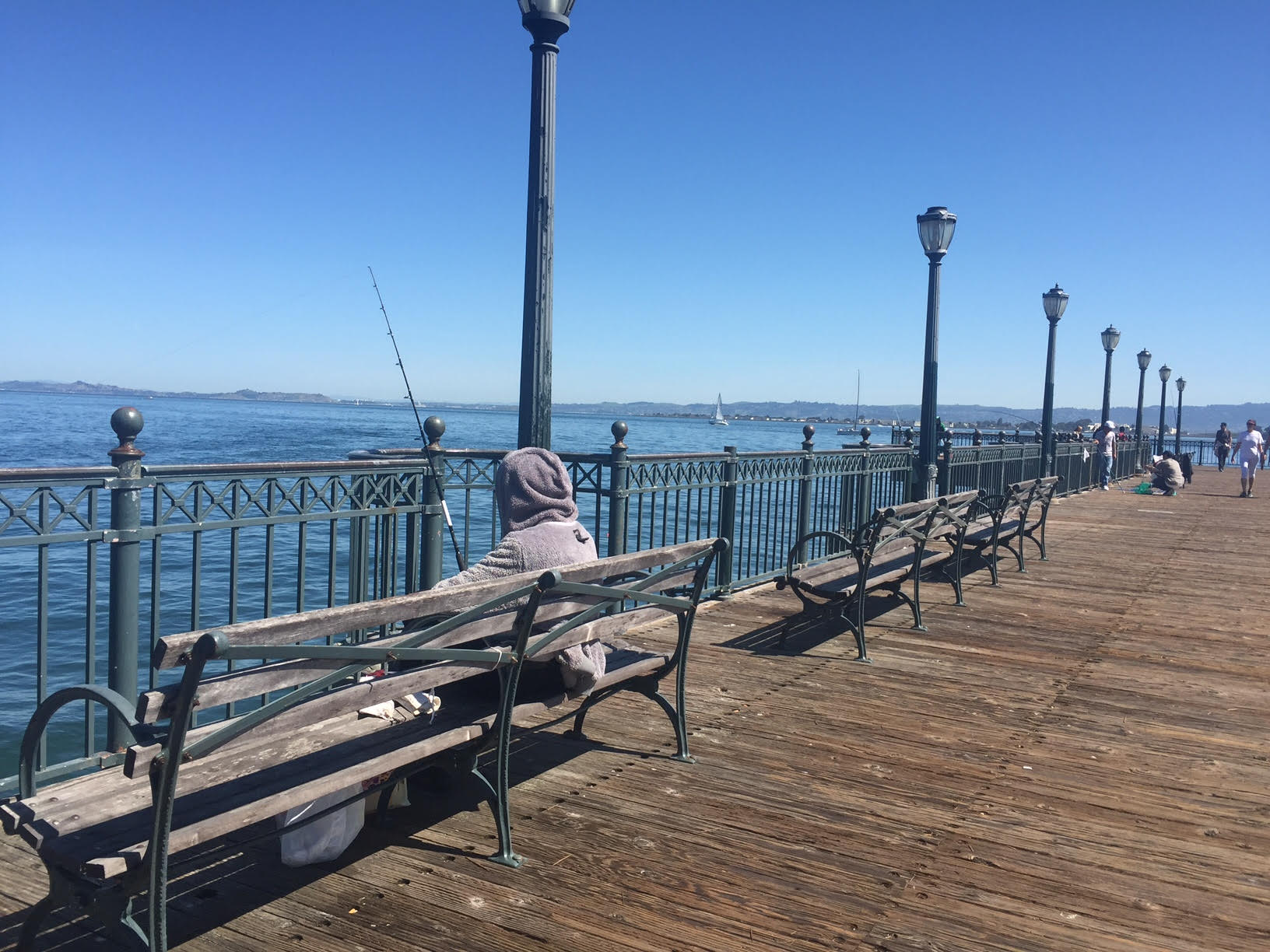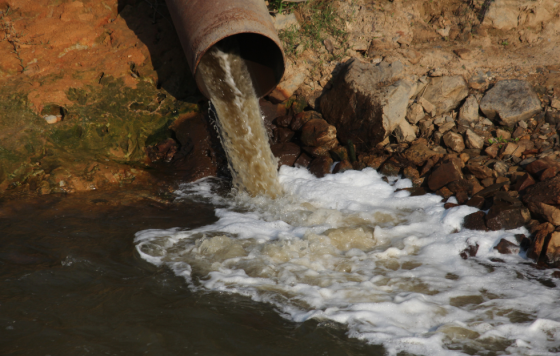
It's 11 am on Sunday April 17 on a wooden pier near the ferry building in downtown San Francisco, and the sun is streaming down on an 80-degree weekend.
There aren't many locals around. A teenage couple hold hands on a bench giggling over something on the young man's iPhone, and a family of four bumps their suitcases back along the pier, towards the BART station at Embarcadero, having recently disembarked from a hulking cruise ship docked by pier 39, a half-mile away. They only came up the pier to admire the Bay Bridge one last time, and to pose for a photo before their vacation is officially over and they head to the airport. The mother is frustrated that they haven't “just taken a cab already.”
The mood on the pier is light, with kids eating ice cream, and most people seem comfortable answering a stranger’s greeting or even, question. A baby boomer in a sun visor spots the cruise ship party and swings his big voice in their general direction:
"Hey buddy, did you just get off the cruise?"
The father, struggling manfully with his suitcase, shoots back: "Yeah, how did you guess?"
"Did'ja have a good time? We're getting on at five..."
"Oh, yeah. It was a blast," says the father, elongating the 'a' in ‘blast’ with his enthusiasm.
So the boomer, satisfied that his money hasn't been wasted, moves on with a pleasantry. Then he stops on the side of the pier to ask a gentleman fishing if he ever sells his catch.
"Na I'm just like you," says the fisherman in a quiet voice. "I just fish for...recreation." It's a notably clipped, tired-sounding and evasive answer on an otherwise breezy morning, and the boomer seems to check himself, realizing from the fisherman’s tone that he may have stumbled unawares into a type of conversation he wasn't anticipating. Then he moves on without engaging further, presumably looking forward to embarking on his cruise, later, and not giving the interaction much further thought.
Meanwhile, the fisherman and his brother have been down here since the early morning.
"I haven't had a cigarette since I got on the bus in Santa Rosa, and that was five hours ago," he says.
This man and his brother fish to eat, once or twice a week, off the piers in and around the San Francisco Bay, although at first, he won't admit to it, when I introduce myself as working for Clean Water Action. I'm actually wearing a T-shirt with the organization’s name on it, having come down here for a promotional event, and I couldn't feel more conspicuous. I say we're running a campaign to protect people who fish in the Bay. We're looking to meet people who eat the fish from these waters, because the proposed pollution standards aren't strict enough, yet, to ensure that people who subsistence fish won't get sick from eating what they catch. The campaign is quite theoretical, involving numeric standards for toxicity, and I'm trying to give our members and general readers a sense of why it matters to protect people by doing the work. Most of this pitch I deliver generally into the middle distance, wondering aloud if he might know anybody like that, and feeling every ounce of my privilege weighing uncomfortably between us in the air. After all, I'm asking for his story to illustrate the importance of our campaign, and yet he doesn't really owe it to me or to anybody.
"I just pick 'em up, take a picture, and throw them back in," says the man, dressed in frayed denim jeans and a hoodie that has also seen better days. On closer inspection a lot about this man is closed off, pinched, and would really rather avoid this kind of do-gooding scrutiny. Or any scrutiny at all. Eventually he tells me that he eats the fish, but only after I offer him a cigarette and assure him I'm not a policeman, a reporter, or looking to enquire into any fishing license he may or may not have. It feels a little shady, our conversation. And some of my speaking into the middle distance feels a little presumptuous. Like I'm asking him to give me insight into to a world a distance apart from society that I've no business really probing. And I'm fully aware that the cigarette we’re both smoking helps prolong the conversation. I wonder about the ethics of it. Whether I should have just offered him $20 to talk to me, even, whether that may have been more straightforward than the forced familiarity of mutual tobacco consumption.
"Sorry to lie to you. We get a lot of questions and most of the folks down here just know it's best not to talk about it," he says. "We just come down to take enough home with us and move along. This isn't something many of us are proud of. I don't need a hand-out. What's that about ‘give a man a fish?’ Well, I know how to fish.”
He wants to get on. He won't give his name and I feel bad for asking. His brother is looking increasingly wary of me and moves off down the pier to tend to another rod. I pepper him with questions, sensing a closing window of opportunity: The man tells me he eats fish from the Bay up to five times a week, taking a handful or two home with him at a time in a plastic bag filled with half-melted ice bags, and gutting them quickly in a plastic tub when he gets home. He'll eat whatever he catches, from striped bass to shad or mackerel, and most of what he catches keeps long enough to last the week and save him and his brother a bunch of money on groceries.
An unemployed veteran who has served some jail time—he gets familiar reasonably quickly after the initial disclosure about the fish—he knows the heavy metals in the water aren't particularly good for him, but at the same time, he has bigger fish to fry, health-wise, if I'll excuse the expression. And financially, the need to eat trumps other priorities.
"I'm on disability, and I smoke cigarettes," he says. "I'd be surprised if the fish is gonna kill me before they do."
“Most people down here are tourists,” he says. “They don't think they're brushing shoulders with the likes of me and my brother, but we’re out here surviving. And we do our best. It's not like we’re homeless or anything. We're surviving. We're doing okay. Tell them we’d appreciate it if the fish were cleaner, but that's it. We're golden. No reason we should be made to feel ashamed of what we do.”
—Read more about our campaign to clean up the bay for everyone, and download a factsheet here.
—Take action! Support the campaign by writing to the water regulators here.


